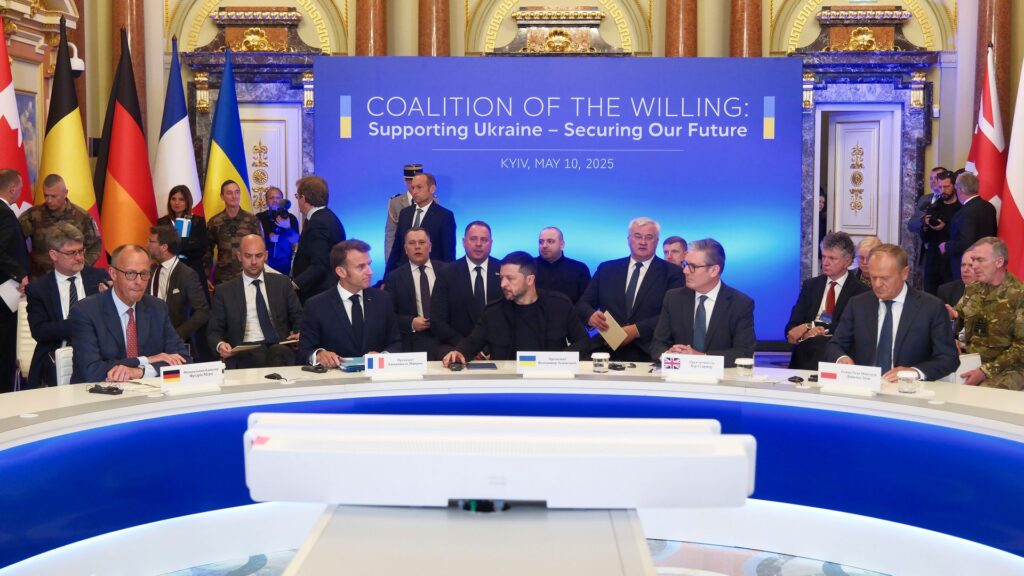Russia could face harsher sanctions if it doesn’t agree to an unconditional 30-day ceasefire in its war with Ukraine, the leaders of four European nations said Saturday, May 10. According to The Associated Press, the United Kingdom, Germany, France and Poland have drawn up a ceasefire proposal, which has the endorsement of U.S. President Donald Trump, to begin Monday, May 12.
Ukrainian President Volodymyr Zelenskyy said the ceasefire must last 30 days “to give diplomacy a real chance.”
Putin could face ‘massive sanctions’, European leaders warn
Trump was reportedly briefed on the proposal by phone earlier Saturday, and French President Emmanuel Macron said the U.S. will oversee Russia’s compliance with the agreement. If Russian President Vladimir Putin fails to uphold the truce, Macron said, Moscow will face “massive sanctions … prepared and coordinated, between Europeans and Americans,” including on its banking and energy sectors.
Russia seems undeterred, however. According to NPR, Kremlin spokesperson Dmitry Peskov said Saturday, “We hear many contradictory statements from Europe. They are generally confrontational in nature rather than aimed at trying to revive our relations. Nothing more.”
In a separate statement, Peskov said, “We have to think this through. It is a new development,” adding, “But trying to pressure us is quite useless.”
Ceasefire proposal amid Victory Day celebrations
The European proposal comes on the same day that a three-day ceasefire imposed by Russia to mark the 80th anniversary of its victory over Nazi Germany in World War II was set to expire –– a ceasefire that both countries have accused the other of violating.
Speaking to reporters alongside British Prime Minister Keir Starmer, German Chancellor Friedrich Merz, Polish Prime Minister Donald Tusk and Macron, Zelenskyy described their meeting as “a very important signal.” Starmer added, “This is Europe stepping up, showing our solidarity with Ukraine.”
The four leaders, who are part of a 30-nation group known as the “Coalition of the Willing,” were in Ukraine to mark the 80th anniversary of the end of World War II. They also attended a memorial for soldiers and civilians who have been killed since Russia invaded the country in 2022.
The symbolism of the European proposal coinciding with the end of Russia’s Victory Day celebrations was on full display. The U.S. special envoy to Ukraine and Russia, retired Lt. Gen. Keith Kellogg, said that the “comprehensive” ceasefire –– which includes air, land and sea attacks, as well as those on infrastructure –– “will start the process for ending the largest and longest war in Europe since World War II.”
Ukrainian security guarantees
While the European leaders’ announcement largely focused on a ceasefire, they also addressed security guarantees for Ukraine once the war comes to an end. Those include providing Ukraine with more weaponry, investing in its defense sector, and potentially deploying a joint foreign military presence in the country. However, Ukraine’s long-sought-after membership in NATO, which Kyiv views as its most promising guarantee for continued safety and security, was not mentioned.
It’s also unclear exactly what the terms of the ceasefire are, or what Ukraine would have to concede in order to achieve lasting peace. Putin has maintained that Russia’s continued control of Crimea and other territories it has taken over since launching its invasion is crucial to any potential deal, something Trump has supported in the past. Meanwhile, however, Starmer said Saturday that the European leaders are demanding “an unconditional ceasefire” and that they are “rejecting Putin’s conditions.”
While Zelenskyy has backed plans for a 30-day ceasefire previously proposed by the U.S., Russia has repeatedly failed to step up to the negotiating table. Most recently, however, Putin said that Moscow remains open to peace initiatives and would consider discussions with Kyiv about halting strikes on civilian targets.


